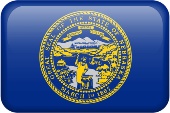 Motorists in the Cornhusker State are required to be financially responsible for any property damage and/or bodily injury caused to a third party as a result of a traffic accident. Drivers in NE have a few ways to choose from in order to be in compliance with the state’s financial responsibility laws. A motorist may obtain a cash bond in the amount of $75,000 by submitting a certified check, bank draft, or money order in said amount. Certain vehicle owners may be able to provide a certificate of self insurance, but to qualify a person must own more than twenty-five cars.
Motorists in the Cornhusker State are required to be financially responsible for any property damage and/or bodily injury caused to a third party as a result of a traffic accident. Drivers in NE have a few ways to choose from in order to be in compliance with the state’s financial responsibility laws. A motorist may obtain a cash bond in the amount of $75,000 by submitting a certified check, bank draft, or money order in said amount. Certain vehicle owners may be able to provide a certificate of self insurance, but to qualify a person must own more than twenty-five cars.
Although these options exist, the majority of motorists in the state choose to what is considered by many as the most practical way of complying with the law and purchasing a Nebraska auto insurance policy. Not many drivers have the luxury of being able to deposit $75,000 or own twenty-five automobiles. In order to be in compliance, a policy must be purchased from a licensed insurer and contain liability coverage with limits of no less than $25,000 for the bodily injury of one person per accident, $50,000 for the bodily injury of two or more people per accident and $25,000 for property damage per accident.
Consumers should be aware that with the financial responsibility laws with does not include any compensation to the policyholder should an accident occur. In order to do so, motorists would need to purchase additional forms of auto insurance coverage. In order to cover a vehicle for physical damage a motorist would need to obtain comprehensive and collision coverage. Additionally, should a motorist suffer bodily injuries in a traffic collision they will have no protection in place unless they have a healthcare plan, the other party is at-fault and insured, or they obtain an add-on to their policy that will pay for such injuries.
Nebraska’s motorist should also be sure to stay on top of their automobile policies with periodic check ups on coverage, rates and needs. According to the Nebraska Insurance Tips For The Consumer this should be done at least on an annual basis and when the insured has experienced a life change such as buying a new car or getting married. In many instances, newlyweds can save quite a bit of money by combining policies since insurers view married couples as a lower risk to insure than singles and also taking advantage of discounts such as the multi-car and multi-lines. In addition, periodically comparing quotes can also lead motorists to a cheaper rate since premiums change over time and as driver’s gain more experience there may be a cheaper company available that was not before.
Source: http://www.onlineautoinsurance.com/nebraska/